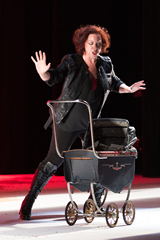| Opera Reviews | 19 April 2024 |
An enticing operatic samplerby Arlene Judith Klotzko |
|
| Opera and the French Revolution Opera Lafayette Rose Theater, New York May 2016 |
|
|
The love affair with antiquity which began in the Renaissance period persisted in France well beyond the time of Rameau and Poussin. And what the Greeks in particular embodied - freedom, democracy and the veneration of the individual - achieved profound resonance during the revolution. Jacques-Louis David, perhaps the greatest painter of the revolution, painted both Socrates Drinking the Hemlock and The Death of Marat. In a program note, the director, Mirenka Cechova, wrote that for her the theme common to all three operas is the power to fulfill one’s own will and not the will of others. The three women featured - Antigone, Sapho and Médée - stood fast against injustice. In a tour de force of characterization and singing, all were portrayed by the splendid soprano, Nathalie Paulin. She sang with a rich luminous tone and in Médée, took us on a terrifying inward journey into the tortured psyche of a mother who murders her own children. Tenor Antonio Figueroa appeared in two operas – as Phaon in Sapho and Jason in Médée. With his richly colored voice, seamless throughout his range, he sang both roles with scrupulous attention to the text. Baritone Javier Arrey as Oedipe sang with burnished tone and fine legato. Sophie Junker, the fourth principal soloist, was a lovely Cleis in Sapho and a fine Neris in Médée. The orchestra under conductor and Artistic Director of Opera Lafayette, Ryan Brown, played with great energy and rhythmic vitality. The winds were particularly fine. The chorus, costumed in black and often seen in silhouette, was superb, particularly in Sapho. They demonstrated an impressive psychological range and even doubled as stage hands; when lightning was required, they even spun lights round and round for dramatic effect. They had a key role in a production which was extremely simple, with more of a resemblance to an art installation than an opera set. There were lots of suitcases and a large fish tank in which Sapho drowned as members of the chorus emptied pale after pale of water into the tank. The lighting by Martin Spetlik, who. we were informed in a program note, worked as an electrician while still in secondary school, to be quite effective, particularly in Médée.
|
|
| Text ©
Arlene Judith Klotzko Photos © 2016 Louis Forget |

 Founded in 1995, Opera Lafayette is an adventurous and indispensable period instrument ensemble specializing in rarely performed works and newly discovered treasures in the French repertoire. In their latest offering, presented in Washington D.C. and then in New York’s Rose Theater the company featured excerpts from three operas that were performed at the time of the French Revolution. On offer were Antonio Sacchini’s Oedipe à Colone, Jean-Paul Ègide Martini’s Sapho, and Luigi Cherubini’s Médée. The three composers happened to be two Italians and one German. Cherubini’s work is of course well known, with its vocally and emotionally punishing lead role most memorably sung by Maria Callas. The other two operas were completely unknown to me. Indeed, Sapho is described in the program as a modern premiere.
Founded in 1995, Opera Lafayette is an adventurous and indispensable period instrument ensemble specializing in rarely performed works and newly discovered treasures in the French repertoire. In their latest offering, presented in Washington D.C. and then in New York’s Rose Theater the company featured excerpts from three operas that were performed at the time of the French Revolution. On offer were Antonio Sacchini’s Oedipe à Colone, Jean-Paul Ègide Martini’s Sapho, and Luigi Cherubini’s Médée. The three composers happened to be two Italians and one German. Cherubini’s work is of course well known, with its vocally and emotionally punishing lead role most memorably sung by Maria Callas. The other two operas were completely unknown to me. Indeed, Sapho is described in the program as a modern premiere.





